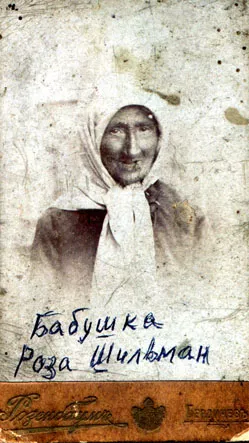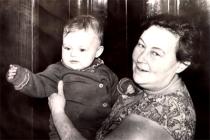My paternal grandmather Rosa Shylman. 'Art photo shop of Rozenbaum in Berdichev'. Berdichev, 1890s.
I want to tell you about my dearest ones: the Shylman family. My paternal grandfather Itzyk Shylman was born in Belopolie town Berdichev district in 200 km from Kiev in 1840s. He was a teacher at cheder and his surname Shylman means 'school man' in Yiddish. The majority of population in Belopolie was Ukrainian, Polish and Jewish. Jews sold agricultural products and were shoemakers, tailors, carpenters, blacksmiths and leather specialists.
My grandmother Rosa Shylman was also born in Belopolie in 1840s. She was a housewife as customary in Jewish families. My grandparents had 9 children: eight sons and one daughter. I don't know the names of my father's older brothers. There was a great difference in age between them. My father's sister Leika was about five years older than my father. She was looking after him and they were very close during their lifetime. My father Duvid Shylman was born in 1888 and was the youngest in the family. They were a poor family and they didn't have baby food for the baby. They wrapped bead in a cloth and gave it to the baby as a baby soother. My father told me that their family was very religious: there was Torah in the house, his father prayed and his mother lit candles on Friday. The family sat down to the table and although there was plain food they always celebrated Sabbath according to the rules. My father recalled how he and his brothers and their parents dressed up to go to the synagogue on Saturday. Grandmother Rosa made clothes for older boys and the younger sons wore their older brothers' clothes after they grew out of it. Though the family had little to live on they always celebrated Pesach, Purim, Chanukkah and other religious holidays according to traditions. Rosa was a good housewife: she had a big vegetable garden and kept chickens. Her children always had clothes to wear and food to eat. Grandfather Itzyk died of some disease in early 1900s. My father hadn't finished cheder by then. My grandmother Rosa had some education. She could count well and after my grandfather died she went to work as an exchange agent at the market. When somebody needed to count money or get smaller change my grandmother was always at hand. She did these operations for a small fee. She was well respected in her town. My father told me that she was cheerful and energetic and always wore a kerchief, as was a custom with Jewish women.















